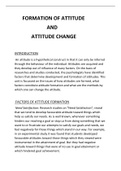Summary
introduction to social psychology summary - attitude formation ,self concept, self presentation
- Course
- PSY100
- Institution
- University Of Toronto (U Of T )
typed summary of basics of social psychology i.e., attitude formation concept of self and self presentation
[Show more]



